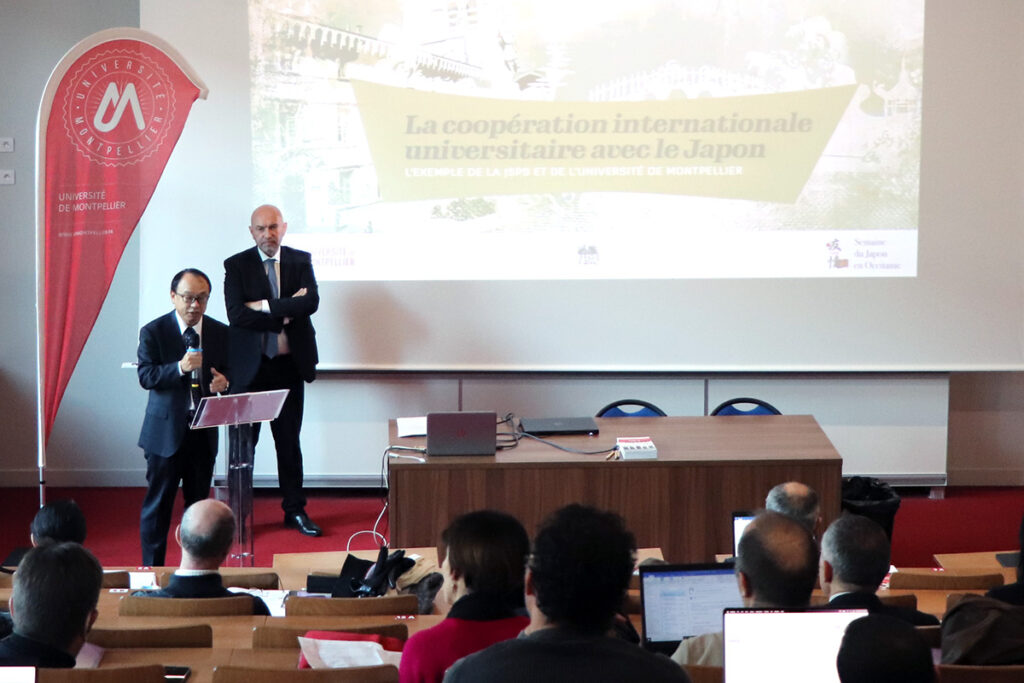The sun rises on UM-Japan partnerships
To mark Japan Week in Occitania, the University of Montpellier and the Japan Society for the Promotion of Science organized a day of exchanges on international university cooperation between France and Japan on November 30.
It was an opportunity to discuss and strengthen the various forms of cooperation between our university and our Japanese partners.

" The Japan Society for the Promotion of Science (JSPS) reports directly to Japan's Ministry of Education, Culture, Sports, Science and Technology (Monbukagakusho). It is the equivalent of Campus Franceexplains Jean-Marie Pincemin, head of the cooperation department (Scoop) at the International Relations Department. Director Kazuhiko Saigo and his colleagues Junko Fujimoto and Chika Koda travelled all the way from Strasbourg, headquarters of the JSPS office for Southern Europe, to take part in this day of exchanges in the presence of the Japanese Consul General in Marseille, Yukuo Murata, President Philippe Augé and Patrick Caron, Vice-President in charge of international relations. " Not all countries have this type of representation, but Japan recognizes France as a major scientific partner," continues the head of the department.
Human adventures
The aim of this event is to promote scientific cooperation by highlighting cooperation programs, and in particular funding, for researchers wishing to strengthen or engage in cooperation with Japan. " Every year, the JSPS launches a call forapplications open to all Professors and teacher-researchers. We took advantage of this opportunity to invite the three current winners from UM to present their projects," continues Jean-Marie Pincemin. Nicolas Louvain and Werner Paulus, researchers at the Institut Charles Gerhardt in Montpellier, and Marc Willinger from the Centre d'économie de l'environnement in Montpellier, came to share their experiences.
"One of the DRI's missions is to inform the UM scientific community that these opportunities exist, and that we are here to support them if they are interested ," explains Jean-Marie Pincemin. Testimonials from alumni Julien Audemard, Bruno Clair and Sandrine Bardet also highlighted the human dimension of international cooperation, as they recounted their daily lives and those of their families in Japan.
Institutional and industrial partnerships
Other funding may also enable French researchers to undertake partnerships and mobility in Japan. " Campus France has an office in each embassy through which the Ministry of Europe and Foreign Affairs funds cooperation programs," explains Scoop. This is particularly true of the Hubert Curien Partnerships (PHC), which operate on the principle of reciprocal funding: " each country finances the travel of its own teams ". In the case of Japan, the Sakura PHC enables doctoral students, teachers and researchers to carry out scientific visits as part of 2-year projects.
Japanese companies are also excellent partners for university research. In his introductory remarks, Philippe Augé underlined the strong links established between the UM and Montpellier-based Horiba Medical: this was illustrated by its Deputy General Manager, Mr. Sylvain Jacquemin, who highlighted research projects, the hosting of student interns, or the funding of CIFRE doctoral contracts, in partnership with the Pathogenesis & Control of Chronic Infections laboratory headed by Philippe Van de Perre.
A wide range of common research topics
Renowned for its world-class reputation in the tech sector, Japan also boasts some lesser-known features. In his presentation, Consul Yukuo Murata pointed out that Japan is 70% forested," says Jean-Marie Pincemin, "and it' s in this context that we've been able to build some interesting bridges with the wood master's program, for example.
" Like Europe, Japan is facing challenges linked to its aging population, and is developing numerous projects around medical and technological issues, but also in terms of ethics, law, sociology and economics. It is also a very agricultural country... The avenues for collaboration between our two countries are potentially rich and very diversified ", concludes the head of Scoop.